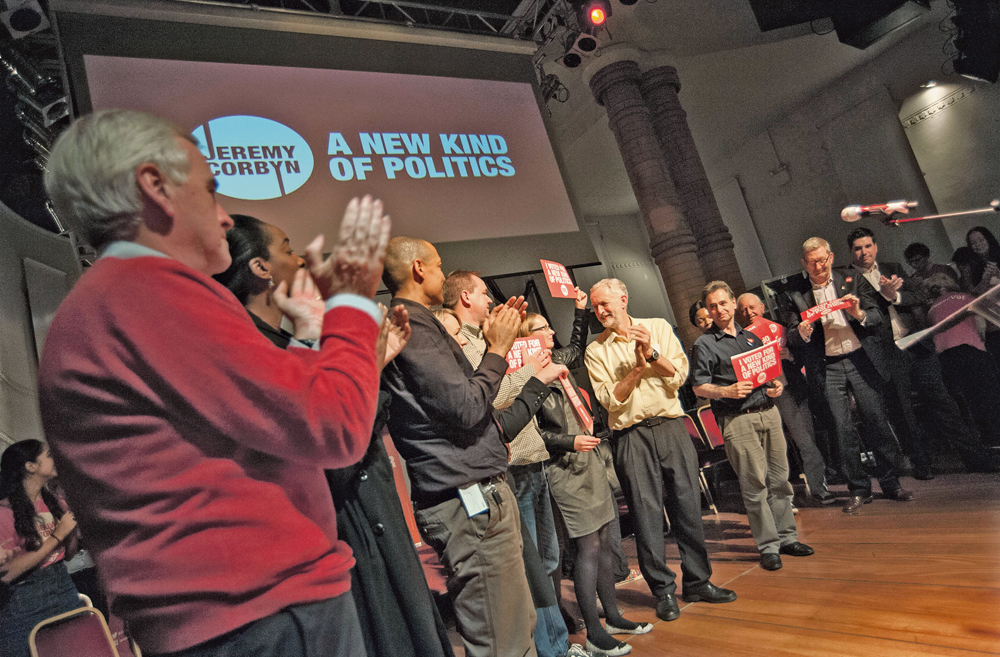TUCG anti-austerity meeting report
Trade Union Momentum launched to organise to defend Corbyn
Neil Cafferky
Over 700 gathered at Westminster Central Hall on 21 November to attend the Trade Union Co-ordinating Group (TUCG) meeting titled: ‘After the Corbyn victory, build the fight against austerity’.
The TUCG was set up by now shadow chancellor John McDonnell alongside several left unions such as the RMT, FBU, PCS, CWU, BFAWU and POA. The initiative of the TUCG in calling the meeting was significant.
In the past few months the largely inert response of the TUC towards the Tory anti-trade union bill has created a vacuum that the TUCG has stepped into, organising protests and lobbies with the assistance of organisations like the National Shop Stewards Network (NSSN).
With this meeting the TUCG has taken the battle onto the political plane by organising a conference in support of Jeremy Corbyn.
Matt Wrack, general secretary of the Fire Brigades Union (FBU), photo by Senan (Click to enlarge: opens in new window)
Significantly, recognising that the struggle to defend Jeremy Corbyn needs organised trade union support, Matt Wrack (general secretary of the FBU firefighters’ union) and Mark Serwotka (general secretary of the PCS civil servants’ union) used the event to announce the setting up of a trade union Momentum.
Anti-union bill
The opening session discussed fighting austerity. Inevitably much of the discussion focused on the threat of the Tory anti-trade union bill.
Speaking from the chair POA prison officers’ union general secretary Steve Gillan reminded the audience his union defies the law every time they go on strike. CWU general secretary Dave Ward injected a note of urgency about the bill. He said all six million TUC members should be getting a letter to their homes informing them of a day of action against the anti-trade union bill.
The middle session with John McDonnell and former Greek finance minister Yiannis Varoufakis speaking attracted the most attention, clearly demonstrated when about half the meeting left straight after Varoufakis finished speaking. He was given a hero’s welcome by the audience.
Varoufakis has gained a certain anti-austerity authority in the minds of many people from his initial stance towards the Troika in the early days of the first Syriza government. The fact that he presided over a catastrophic defeat for the anti-austerity platform Syriza was first elected to does not as yet seem to have dented his appeal to some, at least outside Greece.
EU referendum
While skillfully exposing the failure of austerity policies to lead the capitalist economy out of the Great Recession, he admitted that his alternative proposals to boost demand were not aimed at replacing capitalism but saving it.
Asked about the upcoming European referendum he warned the audience “You cannot escape from Europe. You must stay in and help us democratise it”. Evidently, Varoufakis is asking British workers to give a vote of confidence to the anti-democratic institutions of the EU that were instrumental in crushing the aspiration of Greek workers to exit austerity earlier this year.
John McDonnell warned that George Osborne’s economic policy is in chaos. British manufacturing is likely to go into recession later in the year while the deficit continues to climb higher. He reported that many local councils are now at breaking point. Rob Williams, NSSN chair, asked from the floor if Labour councils would come together to defy the cuts imposed by Tory central government.
John said he intended to call a national conference of councils to campaign against the cuts from central government. This conference would be open to campaigning organisations. This could be good step forward for the anti-cuts movement.
Council cuts
However on the question of councils refusing to implement cuts he appeared to equivocate, citing the fear that council officials could intervene if elected councillors stood up to the government.
This stance was in stark contrast to John’s earlier praise of the direct action, civil disobedience campaigns of Disabled People Against Cuts or his endorsement of illegal strike action by trade unions that might fall foul of the anti-trade union bill.
If disabled people and trade unionists can defy the government what could elected councillors backed by a mass campaign and the considerable powers and assets of a local council achieve?
The final session was on building the alternative. With the recent attacks on Corbyn from the Labour right wing still fresh in the press, much of the discussion focussed on defending his leadership.
Matt Wrack labelled the most vociferous anti-Corbyn Labour MPs as ‘enemies’. Alongside Mark Serwotka he called for a trade union Momentum with the aim to “organise, organise, organise.”
If it recognises that the battle cannot be restricted to the channels prescribed by the Labour Party rule book, but mobilises forces of struggle inside and outside the Labour Party, a trade union-led organisation like this could play a central role in the events ahead.










